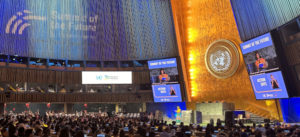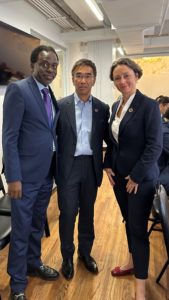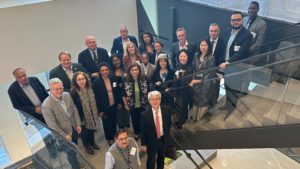The United Nations Summit of the Future took place in New York on 22 and 23 September. IDOS Director Prof. Anna-Katharina Hornidge represented the Institute in New York and contributed to various events in preparation for and around the Summit itself.

Against the backdrop of current and future global challenges, the summit addressed the pressing issues of our time. These included the question of how young people can be better involved in decision-making processes, how the international financial system can be made fairer, but also: how can and must the United Nations reform itself in order to respond to global shocks and crises in a more structured and coordinated way and to achieve a better impact in the world?
On 20 September, for example, Anna-Katharina Hornidge spoke at an online briefing on the Summit organised by DGVN, Global Policy Forum (GPF), Forum Environment and Development and SDSN Germany. Moderated by Jens Marten, GPF, she spoke about the results to be expected from the Summit and commented on the chapter on science and technology development in the Pact in terms of its significance for shaping future sustainability policy.

Anna-Katharina Hornidge also contributed to a side event organised by the SDG laboratory (Keio SFC Research Institute) and The Asahi Shimbun Company on 22 September on the topic of ‘Sustainability beyond 2030: Engaging Generations of Actors’. As co-chair of the steering committee of SDSN Germany, Anna-Katharina Hornidge represented the German SDSN network and, in dialogue with other experts and youth representatives from Japan, the USA and Germany, reflected on how future generations can be better involved in the implementation of the sustainability agenda.
Another important event was an event organised by the Rockefeller Foundation, which also took place in New York on 22 September. In dialogue with representatives of renowned think tanks from the G20 member states, Anna-Katharina Hornidge discussed the potential of global think tank cooperation and the legacy of the Brazilian G20 presidency and the Italian G7 presidency. As a speaker in a panel discussion moderated by Nicolas Buchoud, Asian Development Bank Institute (ADBI), she analysed the voting behaviour observed in the morning in the General Assembly in relation to the amendment to the Pact for the Future submitted by Russia and in the follow-up to the Pact itself against the backdrop of geopolitical controversies.

In addition, she reflected on the significance of the 2030 Agenda in recent agenda-setting at European and US level. With regard to the further development of G20 advisory work, she emphasised the increasing importance of equitable international research cooperation and collaboration between international think tanks in order to address obstacles in the implementation of the sustainability agenda and create new synergies. The cooperation of think tanks, which brings together scientists from countries from different regions and income levels in the context of the G20, constitutes a format for maintaining a continuous dialogue and tackling global challenges together, even against the backdrop of growing geopolitical tensions.
Dr Axel Berger, Deputy Director (interim), took part in a retreat organised by the Rockefeller Foundation, the Research and Information System for Developing Countries (RIS) and Dalberg Advisors to deepen the exchange and cooperation with representatives of think tanks from the G20 member states. From 26 to 30 August, the participants met at the Rockefeller Foundation’s Bellagio Center and focused in particular on the India-Middle East-Europe Corridor (IMEC). Axel Berger moderated a session on the principles and areas of application of economic corridors and chaired a working group on the development of solutions in the area of economic corridors. Among other things, the group worked on the reasons for creating and maintaining an economic corridor in the IMEC region, as well as on questions of financing, responsibility and effective cooperation for the creation of such a corridor.

Schreibe einen Kommentar